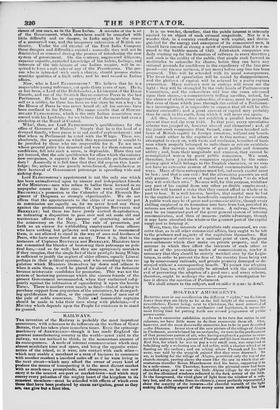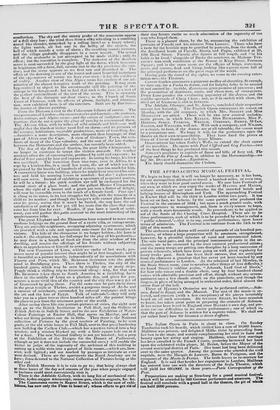HOLYDAY AMUSEMENTS.
RUNNING over in our recollection the different " sights," we find them fewer than they are likely to be at the full height of the season ; but nevertheless, Easter being, next to Christmas, the most universal of holydays, equally welcome to mechanics end legislators, it seems the most fitting time for putting forth our annual programme of public amusements.
As each successive exhibition receives in its turn due notice in our columns, we have little more to do than enumerate them all. One, however, and the most deservedly attractive, has to be in part described —the Diorama. In our view of the new picture of the village of Alagna in Piedmont, overwhelmed by an avalanche, we were in the predicament of that penurious patron of art, who, having employed a painter to orna- ment his staircase with a picture of Pharoah and his host drowned in the Red Sea, for which he was to pay a very small sum, was surpi ised at beholding only a weltering sea of red ochre, with a chariot-wheel or so floating on the surface ; and on asking where Pharoali and his host were, was told by the waggish painter that they were drowned. So we, in looking for the village of Alagna, perceived only the top of the church-steeple, peering above the snow like the one to which that ad- venturous traveller Baron Munebausen tied his horse, it to be a mile-stone. On Thursday, however, the pictorial snow had been shovelled away, and we saw the little Alpine village by the red light of its fire-illumined windows reflected in the dark mirror of the lake. In the foreground, the vivid glare of light from the window of a soli- tary hut, and the smoke from its chimney, (most perfectly represented,) show the security of the inmates—the cheerful warmth of the light making the chilling aspect of the snowy scene more striking but less comfortless. The sky and the snowy peaks of the mountain* oppose of a dull slaty hue; the wind rises from a silky whistling to a rumblieg sound like thunder, mimicked by a rolling barrel or a heavy %% heel ; the lights vanish, all but one in the belfry of the church, the bell of which sounds a note of alarm ; the rumbling sounds increase, and the village gradually disappears in a snow wreath. The actual fall of the avalanche is not attempted to be made visible ; only its effect ; but the transition is complete. The darkness of the desolate scene is next succeeded by the gray light of the dawn, which increases in brightness, till a faint, dull, roseate tint in the sky proclaims the sun. rise ; and the scene appears as we first saw and described it. The effete of the dawning is one of the truest and most beautiful imitations of the appearances of nature we have ever seen : it has the vividness of reality. Another view of this Alpit e scene ha' coalirmsd our ad- miration of the almost deceptive truth of the painting. It may seem hypercritical to object to the overwrought stillaile painting of the cottage in the foreground: but to feel tLat such is the ease, is a test of the perfect verisimilitude of the rest of the scene. This is certainly the best of the dioramic out-door views ; as the (leach of Santa Croce at Florence, with its effects of gloom, daylight, and illumina- tion, now exhibited here, is of the interiors. Both are by 'locates— the master of illusive painting. From the Diorama a visit to the Colosseum follows of course. The vast panorama of London—the conservatories and fountain—the grottoes, Swiss cottage, and Alpine scene—and the -saloon of sculpture—are et. tractions that do not require the gloss of novelty to reetenmend them. The African Glen, with its tribes of wild animals and birds—so well stuffed that the timidest visiter need feel no alarm—and its pictures of the country, habitations, vegetable productions, mode of travelling, —furnishes a mute description, more eloquent than language, of that part of Africa near the Cape. A view of Graham's Town, the resi- dence of many of the Cape colonists, and the seat of the late warfare between the Hottentots and the settlers, has recently been added. The lion of the Zoological Garden, the poor little Chimpanzee. is no longer in existence to tempt the visiters onwards His brother monkies often die of consumption, produced by cold and exposure : he died of fever caused by heat and impure air. In saving his lungs, his liver was sacrificed. The transition from tree-tops, even in Africa, to a cage by a kitchen-fire, in a small hot room, the air of which was im- pregnated by the breaths of hundreds of visiters, was too much for him. A convenieta house was building, where he might have received his visi- ters and held his morning levees in comfort : but alas ! a glass case will now serve. Instead of exhibiting a specimen of perpetual motion, be will be a fixture : his quick restless eye will be exchanged for the eternal stare of a glass bead ; and the gallant Master Chimpanzee, whom the sight of a bonnet and a gown put into a flutter of delight, will now be insensible even to the touch of a female hand. Poor ape ! it clung to its nurse, in its last struggles for life, with the tenacity of a child to its mother : and though the keeper's wife cannot plant flowers over its grave, seeing that it won't be buried, she may have the sad satisfaction of gazing at her pet till her tears dim the glass that sepa. rates her from him for ever. Reader, if you have a spark of senti- ment, you will pardon this petite souvenir to the most interesting of the quadrumanous tribe.
The great Elephant and the Rhinoceros have removed to more com- modious lodgings on the ground floor of a rustic villa, or cottage °Imes.. They are amicable neighbours, occupying adjoining apartments, which are provided with a safe and spacious ante-room for the reception of visiters. The hide of the rhinoceros is no longer hidden—his horn is exalted : the elephant, too, has full scope for the play of his proboscis— he may draw in a breath of fresh air from the attic window of his dwelling, and receive the offerings of his friends without subjecting them to apprehension or himself to annoyance.
The new Panorama of Lima, which we spoke of last week, pos- sesses more of popular interest than might be at first imagined ; and it is beautiful as a picture merely, independently of its associations with Pizarro and Peru, which Mr. BURFORD insinuates into the public mind in Brobdignag pica. Thum there is Thebes, the city of the hundred gates, which may be seen by tripping tip as many steps. People think a shilling trip to Gravesend cheap : why, for that sum Mr. BURFORD takes them to South America in a twinkling. lands them in the middle of Lima on a glorious day, and gives his pas- sengers a more vivid idea of the country and the city than many get of of Gravesend by going there. For the same sum he puts them down in the great temple at Thebes, amidst a gorgeous troop of Arabs and a caravan of merchants, surrounded by colossal sculptures rich with
the art and the lore of Egypt. Talk of railroads!—they will only take you to a place two or three hundred miles off : the painter brings the place to you from the uttermost parts of the world.
After seeing these life-size portrait-pictures of cities, the sight seer may go to the British Institution in Pall Mall, and the Gallery of British Artists in Suffolk Street, and to the new Exhibition of Water- Colour Paintings at Exeter Hall, that opens on Monday, and see what our living painters can do in little. Then there is the National collection of Pictures by the great masters of Painting, to be seen gratis, at the old white house in Pall Mall, near to that great lumbering new building the Carlton Club,—which has a portico turned into a bay window, and a window blocked up with a little square hole cut in it for a door. The new National Gallery is not yet finished ; but a peep at the Exhibition of the Designs for the Houses of Parliament, (though as yet it does not include the successful ones,) will enable the visiter to judge of the ingenuity of the architect of this building in cutting up a noble vista into a parcel of little rooms,—which are, how- ever, well lighted ; and are reached by passages as intricate as ever were devised. These are the apartments the Royal Acadamy are to Lave; those devoted to the National Collection of Pictures being at the other end.
The British Museum it is in vain to go to; that being always shut at those hours of the day and seasons of the year when people engaged in business could most conveniently visit it. There is the Adelaide Gallery, with its long list of mechanical curi- osities, hydro-oxygen microscope, steam-gun, electro-magnets, &c. &c. The Cosmorama rooms in Regent Street, which is the nest of exhi- bitions, has now only the Fleas to boast of; whose efforts to get rid of their tiny fetters excite so much admiration of the ingenuity of tae man who forged them. There is a placard there, by the by, announcing the exhibition oL portraits of Fieschi and his mistress Nina Lassnve. Those who have a taste for the horrible may be gratified by portraits, from the death, of the decollated heads of Fieschi, Morey, and Pepin, exhibited at 2$, Old Build Street. Meseta also figures at full length, and "in his
habit as he lived," alongside of Burke the murderer, in Marianne 'les- saunas wax-work exhibition at the Bazaar in King Street, Portman Square ; and in the same room are the effigies of kings, statesmen, Tunas, and orators, dead mid living, looking like a green-room full of the principal performers on the great stage of the world.
Having gone the rotund of day sights, we come to the evening enter. tainim nts—the Theatres.
Covent Garden announces a gorgeous medley of absurdity, fit enough, we dare say, for a Paella to dream, and for bolyday folks to be amazed
at and amused by : its title, Zuzezizuzu, gives promise of nonsense ; and the personation of dominoes, cards, and chess. men, of strangeness. Drury Lane parades the everlasting pageantry of the Jewess, and the catlike spectacle of Chevy (.pace; and, us if to surfeit with show, the- third net of Gustavus is slid in between. The Adelphi, Olympic, and St. James's, concluded their respective seasons last Saturday. The English Opera commences its season on
Monday, with the old company, to which Mrs. Nmearr and Miss Monoausa are added. There will be two new musical melodra- tnatie pieces, in which Mrs. Tact:Lev, Miss RICHARDSON, Miss P. HORTON, SERLE, PERKINS, WRENCH, OXRERRY, ROMER, MIAN, SAIMER, and WILLIAMS, will act. With such a company, and WILSON, as a singer, to boot, if the dramas are at all tolerable, the season must Le u prosperous one. We hope it will, for the performers open the
theatre on their own responsibility. They have fixed the prices at those of Covent Garden and the lesser Minors.
OSRALDISTON has taken Sadler's Wells, to extend the short career of his novelties. Ile opens with Pad Clifford and Guy Fuwkes—two of the best things he has produced this season. Asatev's proclaims in capitals of flame and bills of fiery red, The- Plague and the Fire of London, in addition to the Horsemanship—we. beg Mr. DUCROW'S pardon—Equitation.
The Surry should dramatize the Cholera.



























 Previous page
Previous page